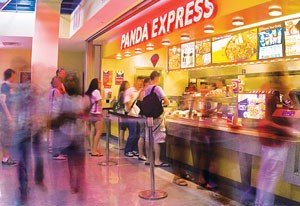Students don’t plan on getting fat. Actually, they don’t plan at all.
And that’s the problem. Between skipping breakfast and midnight junk food binges, college students have notoriously bad eating habits. With a little bit of forward thinking, they can juke the dreaded Freshman 15, said Gale Welter, coordinator of nutrition services at the UA.
The key is avoiding unplanned calories, especially those that come late at night, she said.
“”Those aren’t usually carrots and hummus,”” she said of late night snacks.
To combat this, Welter has a few tips.
Most importantly, she advises students to keep a regular eating schedule. Students should make sure they eat within an hour or so of waking up and then eat something every three or four hours, she said.
Your mom is still right: Breakfast remains the most important meal of the day. Skipping meals leads to overeating later, which can help pack on the calories.
“”Skipping breakfast and saving calories for later – that doesn’t work. It also makes your concentration poorer,”” she said.
A good breakfast is any kind of protein and carbohydrate combination you enjoy, she said. That can be yogurt, cereal and milk, toast and peanut butter, or even a leftover slice of pizza or half of yesterday’s Chipotle burrito.
Another handy tip: Save some food for later.
“”Leftovers are great,””
she said.
Putting aside half of your burrito can help you curb those hefty portions that restaurants give out. Eating healthily at the food court can take some strategy, but isn’t impossible, even at fast-food joints.
“”Let’s say you go to Burger King (in the Student Union),”” she said. “”If you want a hamburger, get the smallest one. Stay away from mayo and cheese. You can save a couple hundred calories right there. Don’t double the burger; get the flavor of it, extra ketchup and pickles. Then go get some Baked Lays instead of French fries at On Deck Deli.””
Watch the soda, too, which can add up the empty calories.
“”I frequently have people who have gained weight coming to me, and they don’t know what happened,”” she said. “”They’ve had 32 to 64 ounces of soda a day.””
Every eight ounces of soda has about 120 calories, so a large 32-ounce drink has 480 calories. It adds up fast. Lemonade and juice don’t get off the hook either; they just have more Vitamin C. Good substitutes are Crystal Light, diet soda and unsweetened iced tea, she said.
Welter also said that a multivitamin for stressed-out students is a “”super idea.”” She also recommended calcium supplements for students who do not eat dairy, aiming for a calcium goal of 1,000 milligrams a day.
The most important thing is to just be aware of what you’re eating, she said.
“”Are you hungry, or are you lonely and homesick? Be mindful late at night, eat breakfast and have a schedule,”” she said.
For more information about eating right on campus, visit the Health Promotion and Preventative Services at www.health.arizona.edu.
Vegetarian alternatives abound at UA
Looking for vegetarian options on campus? The campus dining Web site offers a guide to vegetarian and vegan options, as well as tips on low-fat and low-carbohydrate choices for meat-eaters too.
Being a vegan on campus isn’t too difficult, said Michael Williams, formerly known as the “”Vicious Vegan.””
Williams, a political science major, produced a series of YouTube videos documenting his training and first fight as a vegan boxer in 2007. He has since retired, but he has some knockout advice for UA vegetarians.
“”I’d say it’s not all that difficult to be a vegan on campus,”” he said. “”I’d say that most places – barring fast food places, which I tend not to go to anyways – there’s usually at least some item on the menu that’s acceptable.””
For students stuck on campus, Williams suggests the wraps at Cactus Grill or loading up a bagel at Bruegger’s
Bagels.
“”You can usually get those (bagels) piled high with hummus or sprouts or that kind of stuff,”” he said.
Williams also said that the on-campus Italian restaurant, Three Cheeses and a Noodle, offers plenty of pasta options without meat. Also, he likes the sushi sold in the refrigerators at Bookend Café.
“”Sushi snobs would probably thumb their nose at stuff like that, but I like it,”” he said.
For an off-campus treat that is vegan-friendly, Williams recommends Guilin Healthy Chinese Restaruant, 3250 E. Speedway Boulevard, about a mile and a half from campus.
“”They have vegetarian ‘meats’ there, like a tofu version of duck – and the prices are perfectly reasonable,”” he said. “”It’s probably the best Chinese food I’ve ever visited.””









